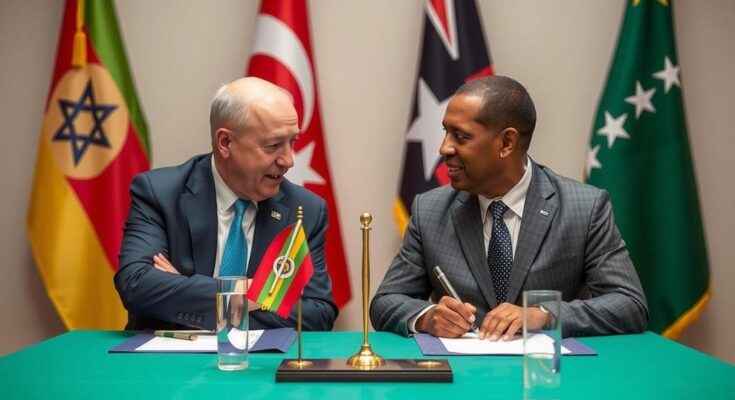Ethiopia and Somalia have signed the Ankara Declaration, allowing Ethiopia access to the sea while reaffirming Somalia’s sovereignty. Brokered by Turkey, the deal aims to foster economic cooperation and mutual respect between the nations. Negotiations to finalize the agreement’s details are set to begin shortly.
Ethiopia and Somalia have initiated a transformative agreement, dubbed the Ankara Declaration, facilitated by Turkish President Recep Tayyip Erdogan. This deal establishes Ethiopian access to the sea across Somali territory while reaffirming Somalia’s sovereignty. During discussions in Turkey, Ethiopian Prime Minister Abiy Ahmed and Somali President Hassan Sheikh Mohamud recognized their mutual respect for territorial integrity and agreed to prioritize collaborative efforts for economic growth over past disputes. This agreement follows a contentious prior understanding Ethiopia had with the unrecognized territory of Somaliland, which had raised significant concerns for Mogadishu. Under the Ankara Declaration, both nations committed to formulating beneficial commercial arrangements that provide Ethiopia secure maritime access, while also acknowledging the contributions of Ethiopian troops to peacekeeping operations in Somalia. Negotiations for specific terms are expected to begin soon, with Turkey offering to mediate and facilitate the process. The importance of this accord cannot be overstated, as Ethiopia has sought sea access since losing its coastline due to Eritrea’s independence, and this new route may bolster its economic prospects in a region facing security challenges.
The background leading to the Ankara Declaration encompasses Ethiopia’s historical loss of maritime access following Eritrea’s secession in the 1990s, which placed Ethiopia at a significant strategic disadvantage as the world’s most populous landlocked country. Consequently, Ethiopia has depended heavily on Djibouti for trade, making any alternative access to the sea critical for its commercial activities. The region’s geopolitical climate further complicates matters; rising tensions and security threats—particularly from groups like Al Shabab and Houthi rebels—pose additional challenges to regional stability and maritime safety. The declaration also comes amid Egypt’s keen interest in countering Ethiopia’s influence particularly related to disputes over Nile water usage and dam construction. Thus, the new agreement reflects broader regional dynamics and economic considerations.
In conclusion, the Ankara Declaration between Ethiopia and Somalia emerges as a pivotal development in regional relations, addressing Ethiopia’s longstanding need for sea access while reaffirming Somalia’s territorial integrity. This agreement signifies a shift towards collaborative governance and shared economic ambitions in light of historical tensions, and has the potential to reshape trade logistics for Ethiopia significantly. As both nations engage in follow-up negotiations to finalize the terms of the agreement, the regional implications of this collaboration will require careful observation, particularly given the complex geopolitical landscape involving Egypt and other regional actors.
Original Source: www.thenationalnews.com




